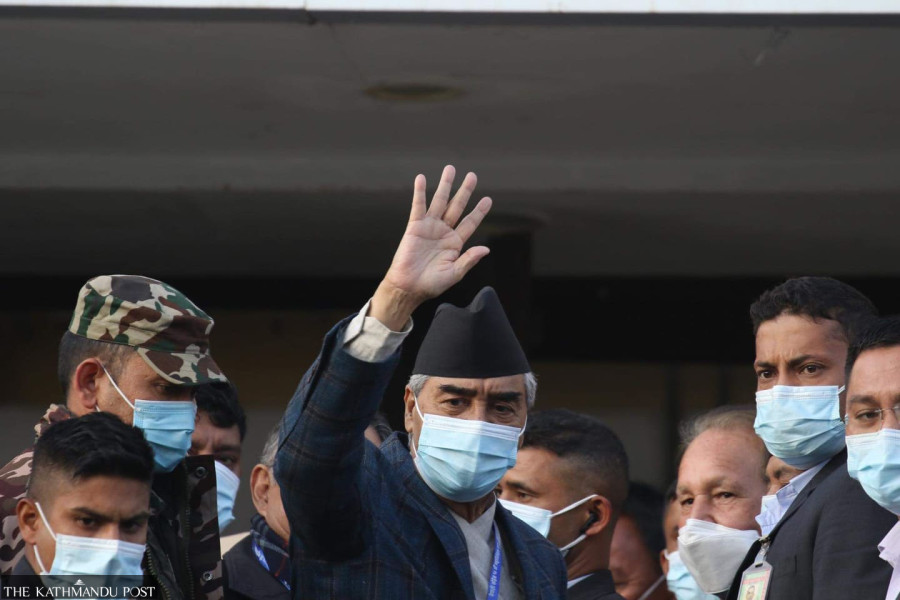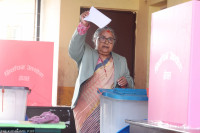Politics
How the Nepali Congress finds its way depends now on how Deuba behaves
Party president has emerged as even stronger leader, he should be accommodative and more liberal, insiders say.
Anil Giri
The counting of votes for electing Nepali Congress Central Working Committee has concluded.
As per the election results, 80 percent of the elected members are from party President Sher Bahadur Deuba’s panel, giving him a complete command of the party.
Out of the total 134 elected—13 office bearers and 121 Central Working Committee members—109 are from the Deuba camp.
When the Congress went to its 14th general convention, there was a wave against Deuba, as a majority of leaders wanted a change in leadership. But as soon as a runoff was declared after none of the five candidates for party president could secure more than 50 percent votes, equations changed, new alignments sprang up. Deuba was re-elected to lead the party.
However, in the general secretary posts, Gagan Thapa and Bishwa Prakash Sharma were elected—both had fought from the anti-Deuba panel. The general secretary post is considered the second most powerful position after the party president in the Congress.
Observers and insiders say even though Deuba commands a majority in the party, he won't be able to bulldoze decisions with the emergence of the new dynamics in the party. In the larger interest of the party, Deuba must try to take dissenting voices along, according to them.
“Since Deuba commands 80 percent control in the party Central Working Committee with a majority of office bearers from his side, this equation gives him a leeway to pass decisions through a two-thirds majority,” said Min Bishwakarma, a leader close to Deuba. “But Deuba is leading the party for the last time, so he is unlikely to make any unilateral moves.
One vice president of the party, Purna Bahadur Khadka, is from the Deuba camp, but the other, Dhanraj Gurung, is from the anti-Deuba camp.
Similarly, of the eight joint general secretaries, Bhisma Raj Aangdambe (Janajati), Mahalaxmi Upadhyay Dina (Women), Farmullah Mansoor (Muslim) and Mahendra Yadav (Madhesi), Kishor Singh Rathor (Khas-Arya) and Umakanta Chaudhary (Tharu) are from the Deuba camp. Only Jeevan Pariyar (Dalit) and Badri Pandey (Backward region) won from the Shekhar Koirala camp.
Leaders say since the party needs to move ahead in a united manner, Deuba must tread carefully.
“We have been suggesting that Deuba forget the factionalism and take everyone on board. He must not alienate [Ram Chandra] Poudel also,” said another leader close to Deuba. “Since the general elections are also approaching, the party leadership, and the party president for that matter, must not take any unilateral decisions.”
After an infighting within his camp–as both Shekhar Koirala and Prakash Man Singh decided to run for party president—Poudel had decided to stay away from the entire convention. He did not even show up for voting.
The Congress finds itself comparatively in a comfortable position when it goes to the polls, as communists are divided. The party, however, needs to find a clear ideological line and unity.
Thapa and Sharma, the two general secretaries, are seen as the leaders who could help guide the party on the ideological front, but it will largely depend on whether Deuba lends ear to them, leaders say.
Koirala, who lost to Deuba, will automatically become a senior party leader.
Koirala is not that hopeful that Deuba will make a compromise “given his nature.”
“Deuba may try to sideline his opponents and rivals, this is what his history says,” said Koirala. “Now it is up to Gurung, Sharma, Thapa, Pariyar and Pandey how they can put him in check and force him to take the party forward in a united manner.”
According to Koirala, it’s high time Deuba made an introspection, as he is leading the party for the last time and the Congress would be going to elections under his watch.
“How the Congress will move forward will largely depend also on how Deuba wants to run the party and what kind of roles he will offer to his teammates, including Gurung, Thapa and Sharma,” Koirala told the Post. “So first of all we have to see how Deuba functions, how he makes efforts to bring everyone under one roof.”
When the convention started, Deuba’s eyes were set on winning the party president post. He wants to make a comeback as prime minister—for the sixth time—from the upcoming elections. But he has not shared what his visions are for the party and for the country.
On the contrary, Thapa, the newly elected general secretary, had made public a 60-page document before the start of the convention, outlining the party’s programmes and policies—for the next one year until elections and for the next five years after the general elections.
Whether Deuba will be keen on paying attention to such policy discussions like the one proposed by Thapa is yet to be seen, say observers and insiders. The Congress general convention this time was quite technical, aimed only at electing the leadership. The party has said it would hold a separate “policy convention” to discuss ideological issues. No date has been set.
“The fundamental issue Deuba now should understand is that the leadership should be accommodative rather than being powerful,” said Uddhab Pyakuerl, an assistant professor at the Kathmandu University. “If the leadership concentrates power, it becomes authoritative. Deuba is unlikely to follow KP Sharma Oli’s path.”
According to Pyakurel, if the Congress sees new dynamics emerge, it won’t be a surprise, as many young faces have been elected this time.
“Deuba hence definitely faces challenges,” Pyakurel told the Post. “He has to manage leaders from his own group as well. During the runoff, Prakash Man Singh and Bimalendra Nidhi supported him. So he needs to take care of them as well. But within the challenges, Deuba can also find opportunities if he is accommodative and liberal to dissenting voices and his opponents.”
The best way forward for Deuba, according to Pyakurel, is to make his party united and turn it into a pro-people and progessive force.
Deuba for years had remained the opposition within the Congress, rebelling against the Koiralas. In 2002, Deuba even split the party to form his own Nepali Congress (Democratic) in a protest against Girija Prasad Koirala. He, however, returned to the mother party in 2007, but he kept his fight against the establishment.
After GP Koirala’s two terms and Sushil Koirala’s one term as party president, Deuba took the reins of the Nepali Congress in 2016, defeating Poudel. Since then, he has been the establishment leader.
Observers say Deuba started taking a similar illiberal stance against the opponents that the earlier establishment harboured against him.
“Deuba has emerged as a powerful party president but if he fails to accommodate people, he will fail and the party will face the consequences in the elections,” said Puranjan Acharya, who has closely followed Congress politics for years.
Acharya himself also contested from Mornag district to become a delegate for the 14th general convention, but lost.
“It’s time for Deuba to reach out to all the leaders by forgetting who was on whose panel,” said Acharya. “He should learn to be patient, listen to the voices of people like Thapa, Sharma and Koirala. The more accommodative he becomes, the better for the party.”




 20.72°C Kathmandu
20.72°C Kathmandu













